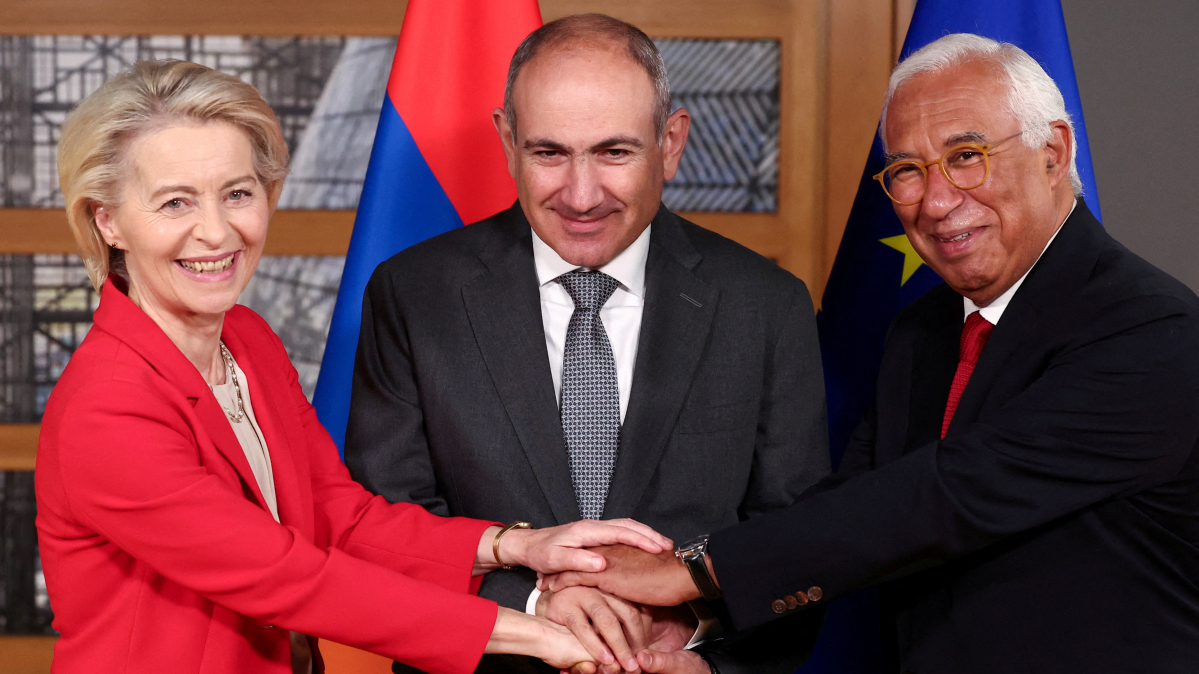WFP warns Somalia food aid at risk of halting by April
The United Nations World Food Programme (WFP) said Friday that its life‑saving food and nutrition assistance in Somalia could end by April without u...

For the first time in decades, the South Caucasus' political gravity appears to be shifting, with Brussels not Moscow increasingly shaping the language of ambition, reform, and legitimacy.
When Armenian Prime Minister Nikol Pashinyan announced that Georgia’s EU candidate status had inspired Armenia’s own legislative move toward European integration, it was more than a symbolic gesture — it marked a quiet turning point in the geopolitics of the South Caucasus.
Armenia’s decision to adopt a law paving the way for EU membership reflects more than a diplomatic rebranding. It is an attempt to redefine the country’s strategic identity after years of reliance on Russian security guarantees that have visibly eroded since the 2020 Nagorno-Karabakh war and Moscow’s subsequent disengagement.
By aligning more closely with the European Union, Yerevan seeks institutional resilience — stronger governance, economic diversification, and access to Western support mechanisms that can cushion it against external shocks. Yet, the path is complex: Armenia remains economically and militarily entangled with Russia and disentangling from that relationship will require not only political will, but also a recalibration of domestic and regional alliances.
Georgia’s EU candidacy, granted in late 2023, provided the region with its first tangible example of progress toward European integration. For Armenia, this was proof of concept: a neighbouring country in the same geopolitical environment demonstrating that the EU path, though demanding, is attainable.
Despite some friction between Tbilisi and Brussels in recent months, Georgia’s early reforms — judicial restructuring, economic liberalization, and its visible European branding — have established a powerful narrative. It is not only a political achievement but also a psychological breakthrough for a region long defined by spheres of influence rather than shared aspirations.
For Russia, these developments represent both a strategic and symbolic challenge. In Georgia, Moscow’s influence has already waned since the 2008 war, replaced by a mix of cautious diplomacy and economic pressure. In Armenia, the Kremlin faces something unprecedented — public disillusionment with its reliability as a security partner.
Moscow now confronts a region where its traditional tools — military presence, energy leverage, and elite networks — are being slowly offset by European soft power: trade incentives, reform frameworks, and the promise of sovereignty through integration. The Kremlin can still disrupt, but it can no longer dictate.
If Armenia continues down its European path while Georgia stabilises its own, the South Caucasus could begin to take on a new strategic geometry. A potential “European axis” stretching from the Black Sea to the Armenian border would create a corridor of governance and trade increasingly oriented toward the EU — an outcome that would inevitably influence Azerbaijan’s calculations as well.
Baku, while unlikely to pursue formal EU alignment, is already deepening its energy and transport partnerships with Europe. The EU’s growing presence in the region could encourage Azerbaijan to strengthen pragmatic ties, even without political integration — a transactional model that serves both sides.
What we are witnessing in the South Caucasus is not a sudden geopolitical rupture, but a gradual reorientation — from dependency to diversification, from reactive policy to strategic choice.
Georgia’s EU candidacy has given the region a new frame of reference. Armenia’s European pivot has given it momentum. Together, they are redefining what it means to belong to the post-Soviet space — transforming the South Caucasus from a periphery of great-power rivalry into an emerging frontier of European influence.
Whether this trajectory endures will depend on consistency — in Brussels’ engagement, in Tbilisi’s governance, and in Yerevan’s reform commitment. But one thing is increasingly clear: the political future of the South Caucasus will no longer be decided solely in Moscow.
Israel is preparing for the possibility of receiving a green light from the United States to launch strikes against Iran’s ballistic missile system, according to Israel’s public broadcaster KAN.
Quentin Griffiths, co-founder of online fashion retailer ASOS, has died in Pattaya, Thailand, after falling from the 17th floor of a condominium on 9 February, Thai police confirmed.
U.S. President Donald Trump’s 'Board of Peace' will hold its first leaders’ meeting on Thursday (19 February) in Washington, D.C., launching an initiative aimed at stabilising Gaza and addressing global conflicts. It's drawn support from regional powers but refusals from several EU countries.
The Board of Peace will be "looking over the United Nations," said U.S. President Donald Trump at the inaugural Washington meeting, where representatives from over 20 countries gathered to unveil plans for Gaza’s reconstruction and coordinate international support.
At least four people have died and 17 others were injured after a liquid gas truck overturned and exploded in Santiago, Chile’s capital, authorities confirmed on Thursday. Police said the driver was among those killed.
Uzbekistan's president Shavkat Mirziyoyev has held a series of high-level meetings in the U.S. aimed at strengthening bilateral economic and strategic ties between the two countries.
Türkiye has signalled readiness to contribute to a proposed Gaza stabilisation force during the inaugural Board of Peace meeting on Thursday (19 February), but according to former Turkish diplomat Mehmet Öğütçü, the decisive factor will be whether Israel and the United States agree on Ankara’s role.
Türkiye is prepared to contribute troops to a proposed international stabilisation force for Gaza, Turkish Foreign Minister Hakan Fidan said on Thursday.
Iran has warned it will respond “decisively” if subjected to military aggression, saying U.S. President Donald Trump’s rhetoric signals “a real risk of military aggression”.
The U.S. government has signed an agreement with Uzbekistan to secure better access to the Central Asian country's critical minerals, as U.S. President Donald Trump moves to counter China's dominance of crucial resources and their supply chains.
You can download the AnewZ application from Play Store and the App Store.

What is your opinion on this topic?
Leave the first comment